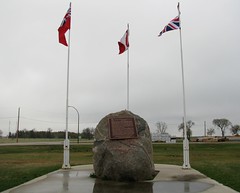Today, in Toronto's Mount Pleasant Cemetery a monument will be unveiled to honour World War I veteran and fighting ace Lt. Col. William "Billy " Barker. It will, no doubt, be a fitting tribute for a man that Canada, including his home province of Manitoba, forgot.
Barker was born in Dauphin, Manitoba on November 3, 1894, his father was a farmer and woodsman. The Barkers spent a few years living near Russell, (he is on the roll of Russell's very first boy scout troupe), but in his early teens the family returned to Dauphin.
When Barker was eighteen he signed up with the 32nd Light Horse Militia based in Roblin, Manitoba and in June 1915 was off to the war with the 1st Canadian Mounted Rifles. It wasn't until he was in Europe that Barker decided to be a 'fly boy' and in April 1917 he was assigned to the 4th Division of the Royal Flying Corps.
During the war he was credited with shooting down 52 German planes and 10 balloons.
On October 27, 1918, Barker, 24, fought the battle that would earn him the Victoria Cross, the Commonwealth's highest medal for bravery.
Returning from a mission, Barker's plane was attacked by a formation of German planes. Wounded and nearly unconscious due to the pain and loss of blood, he managed to shoot down four of them which gave him enough time to cross back over the Allied lines where he crash-landed. (To read Barker's full Victoria Cross citation.)
By the end of the war, Barker had earned the Victoria Cross, Distinguished Service Bar, Military Cross, Croix de Guerre (France), Silver Medal of Military Valour (Italy). He returned as Canada's most decorated war veteran.
Thanks to media attention from around the Commonwealth, Barker enjoyed time in the limelight upon his return. He wasn't able to transform that success and admiration into a steady post-war career, though.
As with many returned soldiers, he fought depression and immobilization due to injury and turned to alcohol to help numb the constant physical pain.
Settling with his wife in Southern Ontario, Barker did some lecturing and co-founded a small charter airline with wartime colleague William "Billy" Bishop, but it soon went bankrupt. He then did test flying for hire.
On a routine flight on March 12, 1930, the plane he was testing nose-dived into the ground at full speed, (some speculate that it may have been suicide). Barker was buried in Mount Pleasant Cemetery where today's monument will be unveiled.
Barker was remembered during World War II and, ironically, used as an example for his fellow Canadians to sign up for the new war. His parents are seen above unveiling a portrait of the ace at the December 1944 graduation ceremony No. 7 Bomb and Gunnery school in Paulson, Manitoba.
In 1999, Dauphin's airfield was renamed Lt. Col W.G. (Billy) Barker V.C. Airport. A commemorative plaque sits outside the front entrance. In 2006 a statue was unveiled inside the terminal.
Related:
Barker and WW II Training Sites Dauphin Tourism
Attestation Papers Library and Archives Canada
William George Barker, V.C. For Valour


















2 comments:
Interesting stuff! Thank you for the enlightenment!
One of Dauphin's elementary school's is named after him as well.
Post a Comment